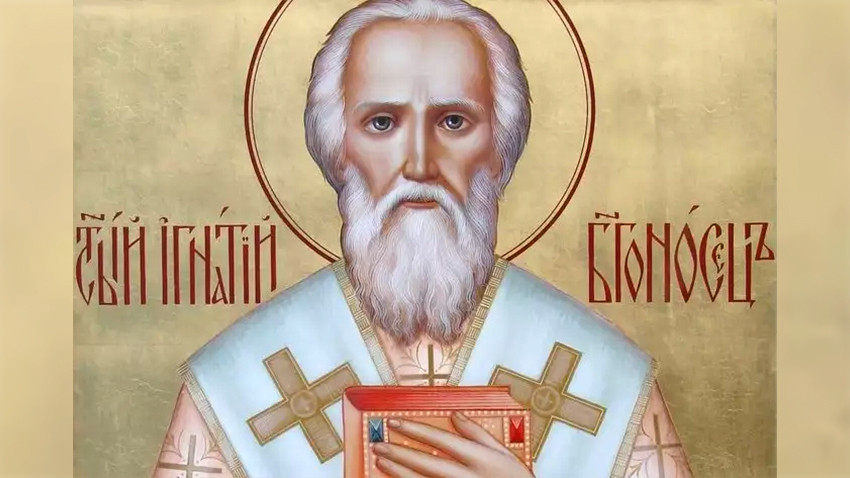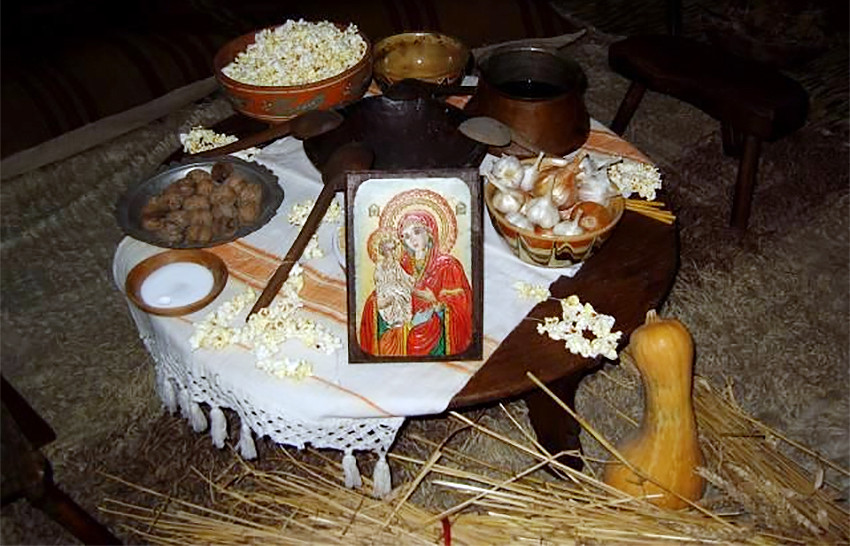On December 20, we pay homage to the holy martyr Ignatius the God-bearer. According to the holy books, Ignatius was the child mentioned in the Gospel of Matthew. The evangelist describes the dispute between Christ's apostles about who among them has primacy. To teach them a lesson, Jesus embraced a child and said: “Unless you change and become like little children, you will never enter the Kingdom of Heaven.". Later, Ignatius became the bishop of the Church of Antioch. He was a student of the Holy Apostle and Evangelist John the Theologian.

Many of the conventions related to the religious meaning of Ignazhden have penetrated into Bulgarian folklore practices. But, surely, the folk custom preceded the establishment of the church holiday. The pagan roots of the holiday have remained unshakable - on the day of the winter solstice (December 22) the new sun, Mlada Boga (the Young God), is born. Therefore, the meaning of the entire ritual cycle is to prepare and welcome its appearance.
Christmas holidays in the traditional Bulgarian calendar begin on Ignazhden. The transition to the new year begins. For Bulgarians, since time immemorial, this time of the year has been associated with important practices carried out with the belief that this will attract good forces. The magic of action and inaction, of touching, naming and blessing - all this is woven into the Ignazhdeni rituals.
The most important thing on this day is who will enter the house first, the so-called “polaznik”. The custom itself known as “polazvane” is characteristic of all areas of Bulgaria. This is where another name for the holiday comes from “polaz” or Polazovden. If the first person who enters the home is in good health, has a harmonious family and is a well-established and caring owner, this is a blessing. All his or her qualities become blessings for the householders.
That is why the more prudent people did not leave it to chance. Before the day of Ignazhden, they would agree with a special person, whom they would welcome first on Ignazhden. Upon entering, he had to first go to the hearth - where, according to popular belief, the patron spirit of the family lives.
In some areas of northern Bulgaria, it was considered very lucky if the first visitor was a healthy pregnant woman. Irrespective of gender and age, the polaznik had to be literally sprinkled with wheat, barley and dried fruits. In some villages of Bulgaria, they even gave him a new shirt and socks. The hosts treated the polaznik to a rich table, and he in return blessed them.
Ignazhden also has another important belief involved - not to lend money. It is related to other customs to preserve well-being and luck in the familiy. It used to be forbidden to take anything out of the house - objects, food, tools. And everyone who went out had to have their hands full on the way back. Usually, people brought in a little straw and piled it behind the door - they believed that this way the hens would lay eggs the whole year.
"The mother of God went into labour, from Epiphany to Christmas" - there are countless Bulgarian folk songs in which these words are found. According to popular belief, the birth pangs of the Mother of God begin on Ignazhden. That's why women didn't work on that day - the meals were prepared on the eve of the holiday.
In some places in Bulgaria, women used to prepare a special mixture of flour and medicinal herbs, wrapped the new leaven and put it in the corner. Throughout the night, one of the women used to stand next to it, and the others played a special dance. Until St. Basil's Day (January 1), this special yeast ("kvas" in Bulgarian) was kept in the same way, moving it to a different house every night. This ritual secret dance was performed only three times a year - on St. Ignazhden, on Christmas and on St. Basil's Day. Bread mixed with it was believed to be magical. For example, if a man decided to deviate from the right path, his wife prepared bread with a little of this sour dough and served it to her husband to attract him to her. Young girls also used its miraculous power to win their chosen one.
Part of the male work on Ignazhden was completely different. On that day, the so-called “stanenik”, the leader of the male carolers, gathered the carol group in his home, which he would lead in a few days. From that day, the carollers began to practice the numerous songs and incantations, passed them on to the young boys, who were going to be carol-singers for the first time.

Ignazhden is also the first incensed dinner, which was a meal without meat and dairy. Let's remember that burning the incense is done only on the biggest holidays, when the meal is both festive and commemorative, when what is placed on the table is a gift to the ancestors, gratitude to the higher forces and is shared only with the closest ones.
Modern-day Bulgarians also abide by this tradition - some are really careful as to who will enter their home on Ignazhden first. Others try not to lend money. But everyone looks forward to the holidays to share them with their loved ones.
Compiled by Albena Bezovska
Editing by Elena Karkalanova
English version Rositsa Petkova
On September 11, 1930, in the village of Tvarditsa, Burgas region, Nikola Stanchev Nikolov was born. A freestyle and classical wrestler, in 1956 he won the first Olympic gold medal in freestyle wrestling in the 79 kg category in Melbourne..
On September 8, when the Bulgarian Orthodox Church celebrates the Nativity of the Blessed Virgin Mary (Nativity of the Holy Theotokos), we take a look at the beautiful valley of Gabrovnitsa River and the Monastery of the Holy Theotokos, better..
It was 1883 when construction began in Plovdiv on the building of the Regional Assembly of Eastern Rumelia, based on a design by architect Pietro Montani. Eastern Rumelia was an autonomous Bulgarian province within the Ottoman Empire and one of the..

+359 2 9336 661
